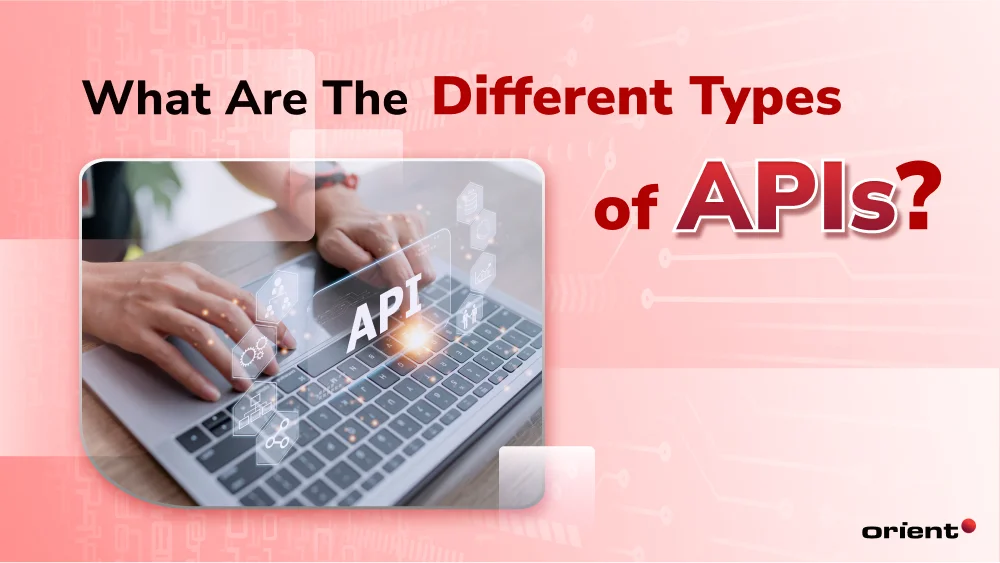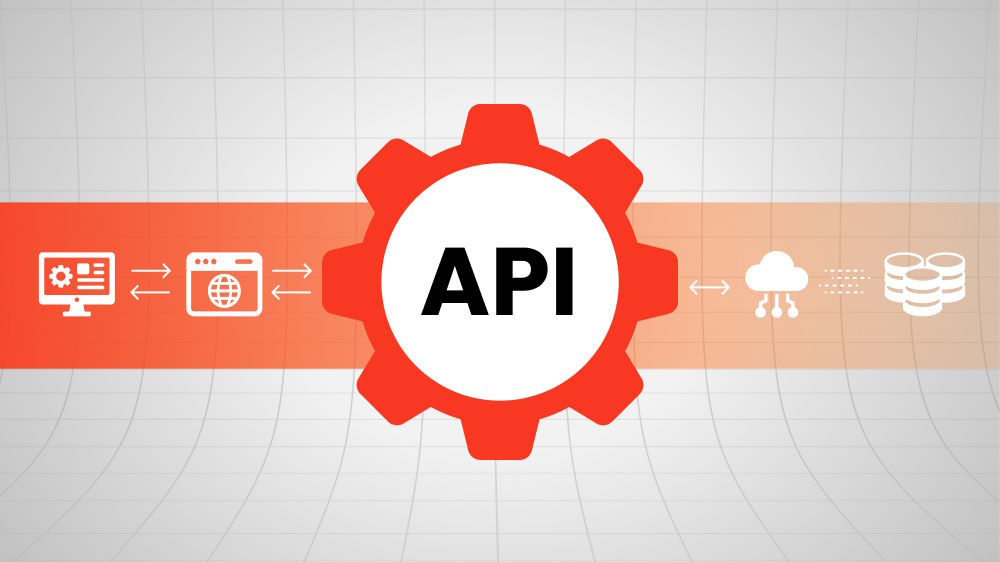What Are the Different Types of APIs?

Content Map
More chaptersAn API is an effective way for disparate and unrelated software applications to share data and functionalities.
APIs are particularly useful for web applications, as they allow software to remotely communicate over the internet with other programs and integrate third-party API capabilities into their software. If you have ever used a delivery service to order food from a restaurant or used your Facebook credentials to log into an unrelated website, then you have used APIs before.
In this post, we are going to discuss the different types of APIs and the different use cases that they are most applicable to.
What Is an API?

By definition, API stands for ‘Application Programming Interface’.
This is a software intermediary that allows different software to talk to each other. Think of it as a bridge. A means to facilitate the sharing of data, information, and functionalities between two unrelated endpoints. Most API calls take about 100 to 300 milliseconds to process, making the transfer of information almost instantaneous.
To ensure this type of communication is safe and secure, APIs set rules and boundaries for each piece of software to follow. These rules define the type of requests and responses an API can fulfill, as well as the strength of the security and access permission controls. For example, if a developer wants to add a payment processing system to their e-commerce platform, then they might embed an API with checkout functionality into the platform.
What Are the Different Types of APIs?

Different types of APIs exist to suit unique business requirements. The main difference between each type of API is the level of access they provide, as well as the strength of their privacy and security protocols.
Non-publicly available APIs typically have extensive access permission controls. These controls require end users to actively be granted permission before they can access an API. Other APIs may have strict privacy protection controls to protect a business’s intellectual property.
Here is a detailed breakdown of the different types of APIs:
Public APIs
A public API is available to any person or company, albeit with some restrictions. They may be free to access, or they may require a one-time or ongoing payment to access. Some public API providers charge a pay-as-you-use model, where you pay for the number of API calls you make. Public APIs may also require a form of authorization or an authentication key to access.
Examples of public APIs include the following:
- PayPal API lets you integrate checkout orders, payments, subscriptions, and other capabilities.
- Deezer API lets you access a database of millions of tracks and playlists.
- The Rapid Translate Multi Traduction API translates HTML, text, words, phrases, and paragraphs into over 100 languages in real time.
Open APIs
Like public APIs, open APIs are available to virtually any person or company. However, unlike public APIs, they typically never charge a fee or come with authorization or authentication requirements. This means anyone can access open APIs at any time without restriction.
Examples of open APIs include the following:
- Twitter API lets developers access various Twitter features, such as tweets and trending topics.
- OpenWeatherMap API lets developers incorporate real-time weather monitoring and forecasting into their applications.
- New York Times API lets users access news articles and other media content.
Partner APIs
Partner APIs are only authorized for use by selected developers and API consumers. API providers typically create these types of APIs so that they can license them out to other businesses. A business will then use these APIs to perform specific business-to-business activities.
For example, a business may join the eBay Partner Network to access eBay APIs. This means that they can engage in affiliate marketing, buying, and selling within the eBay platform but in connection to their system. If you have ever read an article by an author who earned a commission through any products linked to you (say, through eBay or Amazon), then they would have done it with a partner API.
Partner APIs usually contain stronger security and access permission controls than public or open APIs. These controls prevent partner APIs from accepting requests from unknown or illegitimate sources. As a result, they prevent the risk of successful authentication-based attacks and DDoS attacks.
Examples of partner APIs include the following:
- Airbnb partner API for connecting Airbnb listings to your system.
- Shutterstock partner API for giving partners access to millions of royalty-free images, videos, and music.
Internal APIs
An internal API connects different software within a company’s internal system. They are usually not available for third-party use and exclusive to a specific company. For example, a company may use an internal API to connect payroll to HR within the same system.
Since internal APIs are developed for internal use, they often have weak security and access permission controls, as it is assumed that a company will already have its own security measures in place.
Types of API Protocols and Architectures

By now, you are familiar with the different categories of APIs based on their target audience and purpose. However, there is another way to classify APIs. You can categorize them based on their rules, guidelines, and constraints – characteristics that define their unique protocols and architecture.
The most common types of API protocols and architectures are:
REST APIs
REST (Representational State Transfer) APIs conform to the REST architectural style. They are primarily used in web-based APIs for HTTP-based commands (GET, POST, PUT, DELETE) to process API calls. REST APIs are stateless, as they do not store data or status between requests. They also use Uniform Resource Identifiers (URIs) to validate the authenticity of each request.
SOAP APIs
SOAP (Simple Object Access Protocol) APIs are used by web services to transmit data through HTTP and HTTPS communication methods. Unlike REST APIs, which work with JSON, XML, CSV, and various other data formats, SOAP APIs work only with XML, JSON, and CSV. This makes SOAP APIs less versatile and slower but also better suited for applications that require standardized message structures.
RPC APIs
RPC (Remote Procedure Call) APIs are an older style of processing API calls. They are designed to invoke a function or method from a remote server, using local procedure calling to exchange messages synchronously or asynchronously. This allows two processes to exist on the same system. Although RPC APIs are fast and versatile, they are being overtaken by REST APIs. This is because RPC API’s proprietary data format and protocol buffers only support a handful of languages. Meanwhile, the data formats that REST APIs use, such as JSON, are supported by virtually all languages.
How to Choose the Best API for Your Software
The best type of API depends on your unique circumstances. What programming languages do you need to work with? What core functionalities do you hope to acquire? And what in-house or outsourced skills do you require to complete your project? These are just some of the many questions to consider.
If you are outsourcing your software development, then your dedicated software team will know what APIs will work best with your application. At Orient Software, we prioritize open and honest communication with our clients. We take the time to understand your technical stack and business requirements. We then propose custom solutions that fit your unique needs, budget, and short- and long-term goals.
Here are just some of the many factors we consider when choosing the best types of APIs:
Integration Complexity
Integration complexity refers to the difficulty of using an API to integrate one system with another. The more systems an API must integrate with, the higher the complexity. The number of different formats that you need to work with will also influence the type of API you choose.
For instance, if you need to work with JSON, HTML, and plain text, then a REST API would be an ideal choice. This is because RESTful APIs are compatible with those file formats, while SOAP APIs rely on XML by design.
Documentation and Support
Documentation allows developers to troubleshoot problems and use new functionalities quickly. They also contain case studies, which help developers better understand how to apply API best practices in different scenarios.
For instance, API documentation may come as reference documentation, which describes how many endpoints there are and what each endpoint does.
Security and Code Maintainability
APIs are prone to various cybersecurity risks, including vulnerability exploits, DDoS attacks, and authorization errors. A vulnerability exploit is when an outsider sends specific data to an API to exploit a system vulnerability. If successful, the attack may allow the outsider to gain unintended access to the API or the software that the API is connected to.
At Orient Software, we understand that APIs have a larger attack surface than web apps and that web application development is prone to various cybersecurity threats. That’s why we prioritize APIs that contain comprehensive security features, and we follow API documentation closely to incorporate best security practices into your software.
Prioritizing API security best practices at the early stages of your project makes it easier for us to maintain your code. We can identify and address API security issues before they manifest into service-disrupting problems.
Scalability
An API that lacks scalability cannot meet growing customer demand and utilize new features. Scalable APIs can more easily manage a large user base and process more data requests.
One way to increase an API’s efficiency is to use strategic caching, which reduces the number of calls made to a primary data source. Strategic caching is great for scalability as it helps reduce resource consumption and improve the user experience.
Types of APIs for Any Application
Choosing the best type of API for your project can be challenging. At Orient Software, we take the stress out of the API selection process. We identify your unique requirements and help you choose APIs that align with your technical needs and business objectives. Furthermore, we ensure your API strategy integrates seamlessly with your existing system.
Contact us to learn how our software development services can empower your business.







